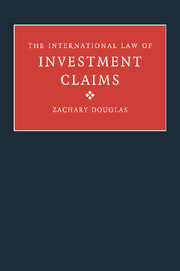Book contents
- Frontmatter
- Contents
- Foreword – James Crawford
- Preface
- Table of investment cases
- Table of cases of international courts and tribunals
- Table of cases of municipal courts
- Table of appendices
- List of abbreviations
- 1 The juridical foundations of investment treaty arbitration
- 2 Applicable laws
- 3 Taxonomy of preliminary issues relating to jurisdiction and admissibility in investment treaty arbitration
- 4 Consent to the arbitration of investment disputes
- 5 Investment
- 6 Jurisdiction ratione materiae
- 7 Jurisdiction ratione personae
- 8 Jurisdiction ratione temporis
- 9 The obligation to accord most-favoured-nation treatment and the jurisdiction of an investment treaty tribunal
- 10 Admissibility: Contractual choice of forum
- 11 Admissibility: Shareholder claims
- 12 Admissibility: Dispositions relating to the legal and beneficial ownership of the investment
- 13 Admissibility: Denial of Benefits
- Appendices
- 1 Convention on the Settlement of Investment Disputes between States and Nationals of Other States (1965) – ICSID (excerpts)
- 2 Convention on the Recognition and Enforcement of Foreign Arbitral Awards (1958)
- 3 North American Free Trade Agreement (1992) – NAFTA (excerpts)
- 4 Energy Charter Treaty (1994) (excerpts)
- 5 China Model BIT (1997)
- 6 France Model BIT (2006)
- 7 Germany Model BIT (2005)
- 8 Netherlands Model BIT (1997)
- 9 Turkey Model BIT (2000)
- 10 United Kingdom Model BIT (2005, with 2006 amendments)
- 11 United States of America Model BIT (2004)
- Index
2 - Convention on the Recognition and Enforcement of Foreign Arbitral Awards (1958)
Published online by Cambridge University Press: 13 January 2010
- Frontmatter
- Contents
- Foreword – James Crawford
- Preface
- Table of investment cases
- Table of cases of international courts and tribunals
- Table of cases of municipal courts
- Table of appendices
- List of abbreviations
- 1 The juridical foundations of investment treaty arbitration
- 2 Applicable laws
- 3 Taxonomy of preliminary issues relating to jurisdiction and admissibility in investment treaty arbitration
- 4 Consent to the arbitration of investment disputes
- 5 Investment
- 6 Jurisdiction ratione materiae
- 7 Jurisdiction ratione personae
- 8 Jurisdiction ratione temporis
- 9 The obligation to accord most-favoured-nation treatment and the jurisdiction of an investment treaty tribunal
- 10 Admissibility: Contractual choice of forum
- 11 Admissibility: Shareholder claims
- 12 Admissibility: Dispositions relating to the legal and beneficial ownership of the investment
- 13 Admissibility: Denial of Benefits
- Appendices
- 1 Convention on the Settlement of Investment Disputes between States and Nationals of Other States (1965) – ICSID (excerpts)
- 2 Convention on the Recognition and Enforcement of Foreign Arbitral Awards (1958)
- 3 North American Free Trade Agreement (1992) – NAFTA (excerpts)
- 4 Energy Charter Treaty (1994) (excerpts)
- 5 China Model BIT (1997)
- 6 France Model BIT (2006)
- 7 Germany Model BIT (2005)
- 8 Netherlands Model BIT (1997)
- 9 Turkey Model BIT (2000)
- 10 United Kingdom Model BIT (2005, with 2006 amendments)
- 11 United States of America Model BIT (2004)
- Index
Summary
Article I
This Convention shall apply to the recognition and enforcement of arbitral awards made in the territory of a State other than the State where the recognition and enforcement of such awards are sought, and arising out of differences between persons, whether physical or legal. It shall also apply to arbitral awards not considered as domestic awards in the State where their recognition and enforcement are sought.
The term “arbitral awards” shall include not only awards made by arbitrators appointed for each case but also those made by permanent arbitral bodies to which the parties have submitted.
When signing, ratifying or acceding to the Convention, or notifying extension under article X hereof, any State may on the basis of reciprocity declare that it will apply the Convention to the recognition and enforcement of awards made only in the territory of another Contracting State. It may also declare that it will apply the Convention only to differences arising out of legal relationships, whether contractual or not, which are considered as commercial under the national law of the State making such declaration.
Article II
Each Contracting State shall recognise an agreement in writing under which the parties undertake to submit to arbitration all or any differences which have arisen or which may arise between them in respect of a defined legal relationship, whether contractual or not, concerning a subject matter capable of settlement by arbitration.
The term “agreement in writing” shall include an arbitral clause in a contract or an arbitration agreement, signed by the parties or contained in an exchange of letters or telegrams.
[…]
- Type
- Chapter
- Information
- The International Law of Investment Claims , pp. 481 - 485Publisher: Cambridge University PressPrint publication year: 2009



